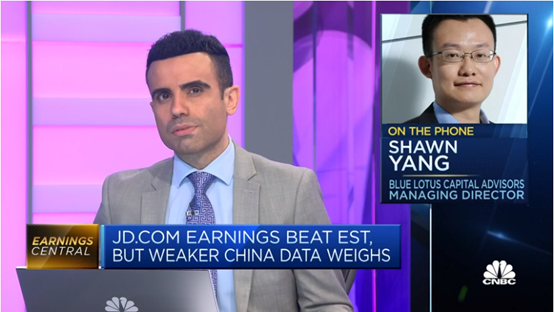2023-09-01
Blue Lotus
August 17th , 2023
Blue Lotus Research Institute’s Managing Director Shawn Yang discussed the recent performance disclosure of relevant companies, including the operational performance of JD.com and Tencent August 17th. He talked about JD.com's merchant subsidies, Tencent's future game reserves, and the challenges these companies will face in the second half of the year.
 |
CNBC interview on Aug. 17th
Q: Shawn, I have one question for you about JD. You are suggesting that we will see retail growth in the 2H23. Is this realistic? I understand the case you're making for JD in terms of trying to increase GMV and merchant count. However, if the customers simply aren't there, they can't provide subsidies without significantly impacting your margins. Can you elaborate on this?
A: Yes, you've raised some excellent points. Smart companies like JD often conduct A/B tests. For instance, they may initially implement some subsidies to observe the results and calculate ROI. If the targets aren't met, why should they continue investing money? On the other hand, I believe JD exhibited certain trends in 2Q23. For instance, with the hot weather, their air conditioning sales performed very well. Additionally, I think the cellphone market performed slightly better than expected in 2Q23. However, as we enter 2H23, these drivers are likely to fade, and market sentiment will play a more significant role. Another crucial category for JD is FMCG, which includes supermarket-like products. I anticipate this segment will remain relatively stable. As for electronic devices like cellphones and PCs, these fall under their traditional categories with inherent advantages, but they will still face increased pressure.
Q: When it comes to Tencent, some individuals are suggesting that gaming revenues are down, yet their performances have exceeded expectations. Could you please explain why the free cash flow differs from what was anticipated, whether it's in terms of operations or more generally? The primary reason for investing in China right now is the belief that investors are obtaining a cheap valuation based on the expectation of these “money-printing” companies, and eventually expect to see positive outcomes. So, what is the current situation with Tencent's free cash flow?
A: Regarding Tencent, their gaming segment didn't perform very well in 2Q23, and it's likely that this trend will persist. However, their advertising revenues have exceeded expectations. Therefore, I anticipate that this pattern will continue, with weak gaming performance and stronger advertising revenues in the future. However, when it comes to cash flow, Tencent faces challenges. Some parts of their business are closely tied to the macroeconomic environment, such as advertising and fintech. But a significant portion of their net income and cash flow comes from gaming, which is not heavily influenced by macroeconomic factors. It's more about their ability to promote and develop high-quality games.
When we examine the competitive landscape, Tencent's key rivals like miHoYo and NetEase are currently promoting high-quality games. Therefore, Tencent is losing market share in the gaming sector. If you are seeking companies highly correlated with China's macroeconomy, you should focus on e-commerce and advertising firms. Tencent still derives a substantial portion of its revenue and profits from gaming, so investing in the company requires a specific risk assessment related to gaming sector.